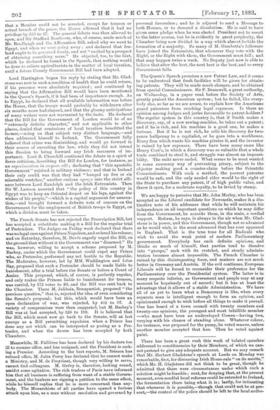The Queen's Speech promises a new Patent Law, and it
seems to be understood that fresh facilities will be given for obtain- ing patents. They will be made much cheaper, and be obtained from special Commissioners. Sir F. Bramwell, a great authority, on Wednesday, in a paper read before the Society of Arts, greatly praised the American system ; but he failed, like every- body else, so far as we are aware, to explain how the Americans guard patentees from crushing legal expenses. Is there an opinion among J udges and juries favourable to patent-holders P The regular system in this country is, that if Smith makes a discovery, say, of a new sewing-machine, he takes out a patent ; and if he is rich, and his machine is a good one, he makes a fortune. But if he is not rich, he sells his discovery for two- pence halfpenny to a capitalist, or he goes into a workhouse. Every firm which wants his machine pirates it, and the inventor is ruined by law expenses. There have been many cases like Henry Cort's, in which a discovery was so valuable that a whole trade combined to steal it, and struggle was almost an impossi- bility. The suite never ended. What seems to be most wanted is some summary way of preventing piracy, subject to the- objector making good a counter-claim before the Scientific Commissioners. With such a method, the poorest patentee- would be safe, and the only needed rider would be the right of the State to purchase any patent, if of high public value, and
throw it open, for a moderate royalty, to be levied by stamp. .














































 Previous page
Previous page